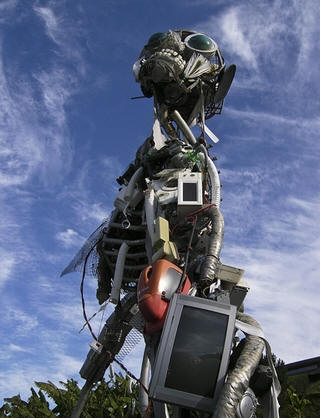What the U.S. could learn from E.U.'s WEEE directive
- September 4, 2012
- By Lynn Maleh | Highly Relevant LLC
 IIamnudds| Flickr.com
“Weee Man at The Eden Project”
http://www.flickr.com/photos/llamnuds/2937611908/
IIamnudds| Flickr.com
“Weee Man at The Eden Project”
http://www.flickr.com/photos/llamnuds/2937611908/
If you've been following electronic waste news, or environmental news in general, you've probably heard of the E.U.'s Waste Electrical and Electronic Equipment Directive (commonly referred to as the "WEEE" Directive). The initiative officially came under European law in February 2003 and seeks to answer the E.U.'s (not to mention the world's) growing electronic waste problem. As our society heads into 2013, scrutiny of the program builds around the directive's 2020 goal of collecting 10 million tons (approximately 44 pounds per capita) of electrical and electronic equipment within the E.U.
While Europe may be uncertain of meeting this goal and has already missed a few crucial deadlines along its journey (i.e. only Cyprus meeting the 2004 deadline for each of the 25 E.U. member states adopting the WEEE directive), at least it is making a veritable effort. Of greater question is how America is holding up in comparison to Europe's push for change.
Falling flat: reducing the export of electronic waste to developing countries
The WEEE directive adamantly bans the export of hazardous electronic waste to third-world countries. While it permits exporting e-waste and e-scrap for recovery purposes, all exportation is regulated for waste classification, destination country, and potential hazard to destination country. Regulations are enforced via treatment center approval applications, quarterly returns, and yearly audits.
America, on the other hand, remains the only industrialized country yet to ratify the amendments laid out by the 1992 Basel Convention. The international summit, held in Switzerland, outlined a treaty for regulating the export of hazardous waste to developing countries and serves as a basis for the WEEE Directive. Instead, America's Environmental Protection Agency (EPA) merely monitors one single type of e-waste export: cathode-ray tubes from old TVs and monitors.
Do we even need a 2011 report from the Government Accountability Office to tell us this enforcement is "lacking?"
Meeting the mission: involving the electronic manufacturers
The WEEE initiative defines all electronic products produced after 2005 as "non historic" and thus the responsibility of the manufacturer to recycle. This ordinance demands the manufacturer initiate some kind of recycling program for its post-2005 products.
The U.S. has not only met this challenge, but exceeded it. Green groups around the country have pushed electronic manufacturers to approach the design of their products with their afterlives in mind. Large electronic manufacturing companies, like Apple, now construct their products using reduced quantities of hazardous-to-destruct materials, like mercury, aluminum, and glass for safer future recycling.
The only hesitation with lauding the U.S. too quickly here is these initiatives spawned from eco-activists and private companies – not the U.S. government.
Electronic waste isn't just one nation's problem, it's a worldwide epidemic. Thus, as the first-world nations, who are primarily to blame for our current e-waste situation, we must pool our resources and strategies together to address this global concern. Hopefully, Europe will push forward where America falls flat, and America can take the reign where Europe has yet to set forth.
Lynn Maleh blogs on a variety of topics, including urban sustainability, green initiatives and eco-friendly lifestyles.
Sources:
http://blog.redemtech.com/2012/01/european-weee-recast-could-influence-us-e-waste-legislation.html
http://en.wikipedia.org/wiki/Waste_Electrical_and_Electronic_Equipment_Directive
http://www.time.com/time/magazine/article/0,9171,1870485,00.html
http://www.mundusmaris.org/index.php/en/projects/2012projects-en/194-marine-litter?start=3
http://www.environment-agency.gov.uk/cy/busnes/pynciau/gwastraff/32102.aspx
![]()
w w w . w a s t e r e c y c l i n g n e w s . c o m
copyright 2012 by Crain Communications Inc. All rights reserved.